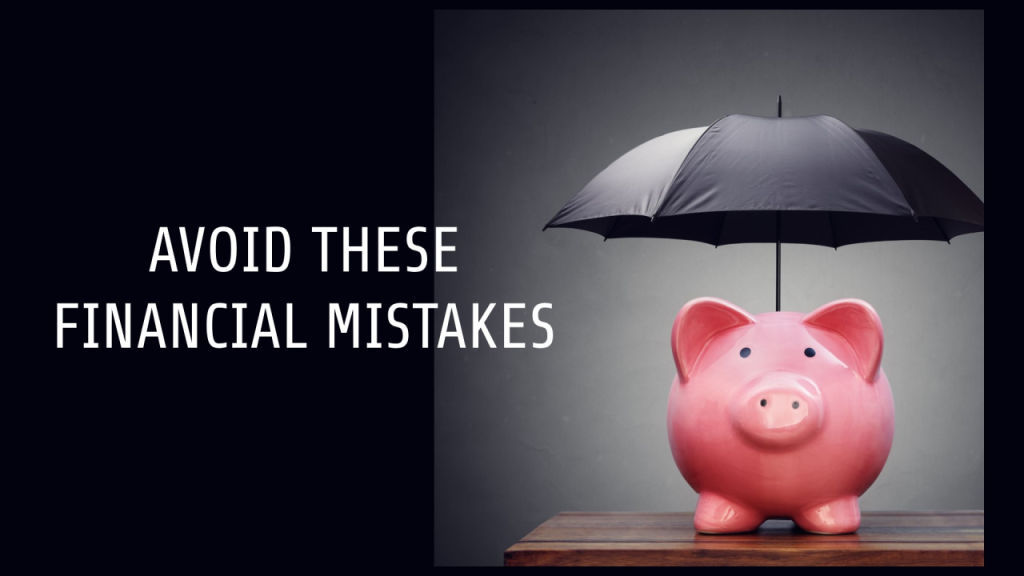
When making financial decisions think long term. You don’t want to make mistakes now that you may regret later. Choices you make today may seem inconsequential, but they can have long term effects.
Not Saving for Retirement
When we are young, we might think we have plenty of time to save for retirement, but reconsider if you feel this way. It takes years for retirement savings accounts to accumulate enough money to finance your retirement. If your employer offers a retirement savings plan put as much as you can in it each month, many employers offer a match up to a certain percent.
Not Having an Emergency Fund
An emergency fund is money you have on hand to cover emergencies and unplanned expenses, having money in an emergency fund ensures that you will be prepared for a sudden expense, and you can handle those expenses more easily. Unemployment, illness, family emergencies and home and auto problems can happen without warning. Most financial experts recommend having enough money in an emergency account to cover 3-6 months of expenses. If you lose your job, you should have enough money in your emergency fund to cover your monthly bills. Having this money allows you to pay your bills while you are out of work without going into debt. Add up your monthly expenses and multiply that by the number of months 3-6 you want to save for. That number is the amount of money you want in your account.
Overspending on a Car
Most of us need a car but we don’t need the biggest and best. A common area people overspend on is purchasing a vehicle. Cars depreciate in value the minute you drive off the lot and an auto loan can take years to pay off. Don’t buy more than you can afford.
Overspending on a Home
When applying for a home loan, lenders look at your credit, your collateral, and your capacity to repay. They look at debt that typically shows up on your credit reports but that does not include many of the other monthly expenses you may have so your approved loan amount may be far more than you can comfortably afford. There are many benefits of purchasing a smaller, more affordable home. Don’t allow your emotions and visions of a dream home cloud your judgement. Your mortgage is potentially the largest expense you will have, you should easily be able to add the house payment into your budget and still have money left over.
Not Having a Budget
A budget helps you track your spending and shows you where you money is going. Use it to track your spending and save for the future.
Impulse Spending
We have all done it, gone shopping for items on our list and came home with things we did not intend to purchase. Impulse spending is buying based on feelings instead of necessity. This might not cause a problem if done occasionally but if it becomes a habit it can lead to financial difficulties. Making an impulse purchase might make you feel happy or satisfied at that moment but later you may realize that the happiness was short lived, and you might regret the purchase and the money you wasted. If you are trying to stick to a budget and save money curbing impulse spending should be a priority.
Incurring Credit Card Debt
Your credit cards should be used as a tool to build credit and earn cash back and rewards points and you should think of it as cash. If you don’t have the money to pay for the purchase in full don’t buy it. Paying your balance in full each month avoids high interest charges, helps you build credit and prevents you from spiraling into debt which could take many years to recover from.
Not Prioritizing Your Health
Not taking care of your health can lead to long term medical and financial consequences. Schedule regular checkups with your doctor, eat healthy and exercise, get enough sleep, avoid unhealthy habits, and find ways to limit stress.
Keeping Up
We have all heard the phrase “keeping up with the Joneses” it is a phrase used to describe the idea of keeping up and comparing ourselves to our neighbors. If they have a better car, better house, better social life we might feel the need to have the same. Don’t do it. Live within your means and never compare yourself or what you have to others. The neighbors that seem to have it all may be drowning in debt.
Overspending When Your Income Increases
If you are living within your means, you have enough money to pay your current expenses with some left over. When you receive a pay raise, tax refund, inheritance or other additional income don’t look at it as free money, instead pretend you never got it and invest the money in savings and your retirement account and continue your current lifestyle. Your future self will thank you.
No Financial Education
Financial education is important for everyone, it allows you to make smart financial decisions and stay out of debt. You can take classes in person or online, talk to financially smart people, read books and listen to podcasts to gain a better understanding of how money, investing, credit and living within your means works.
